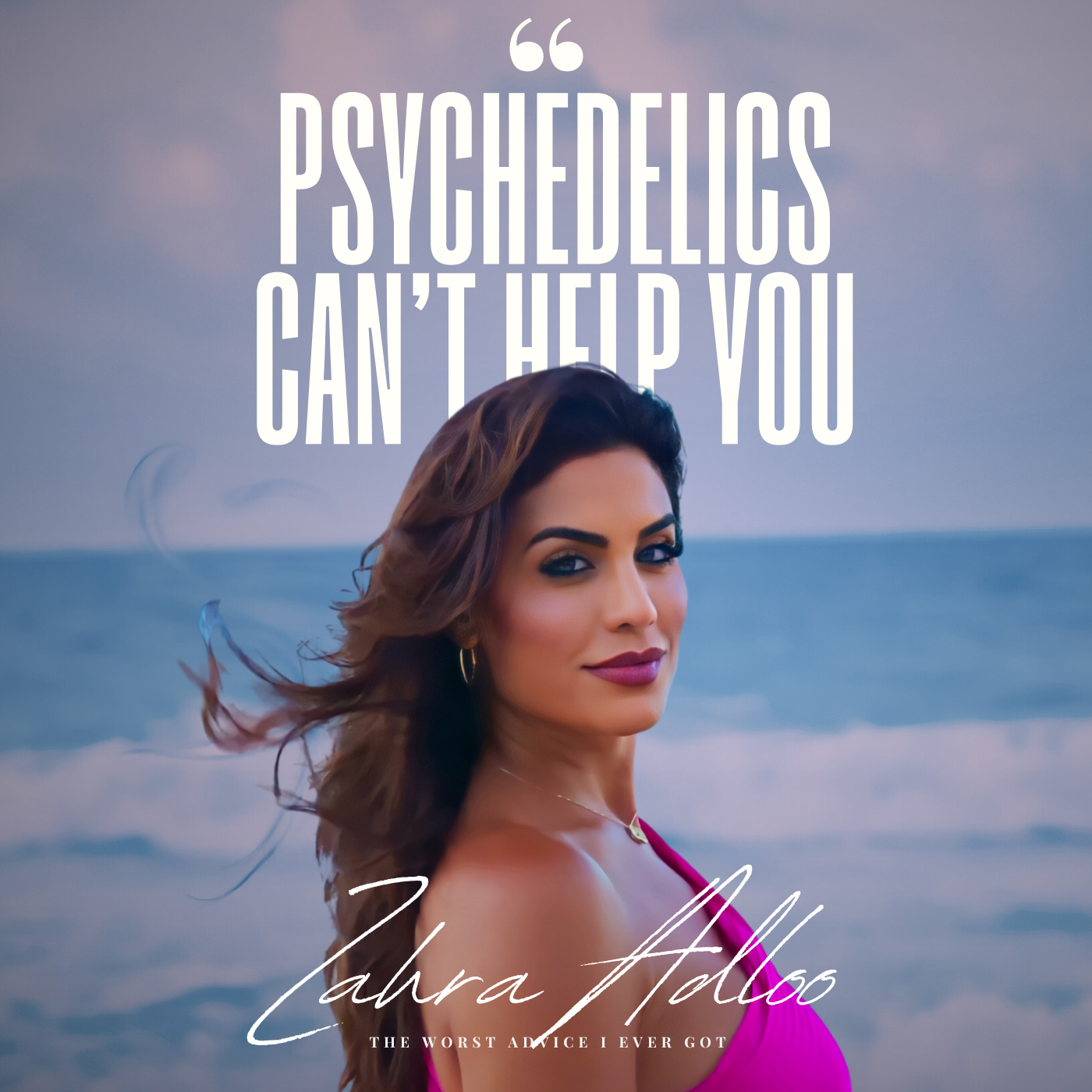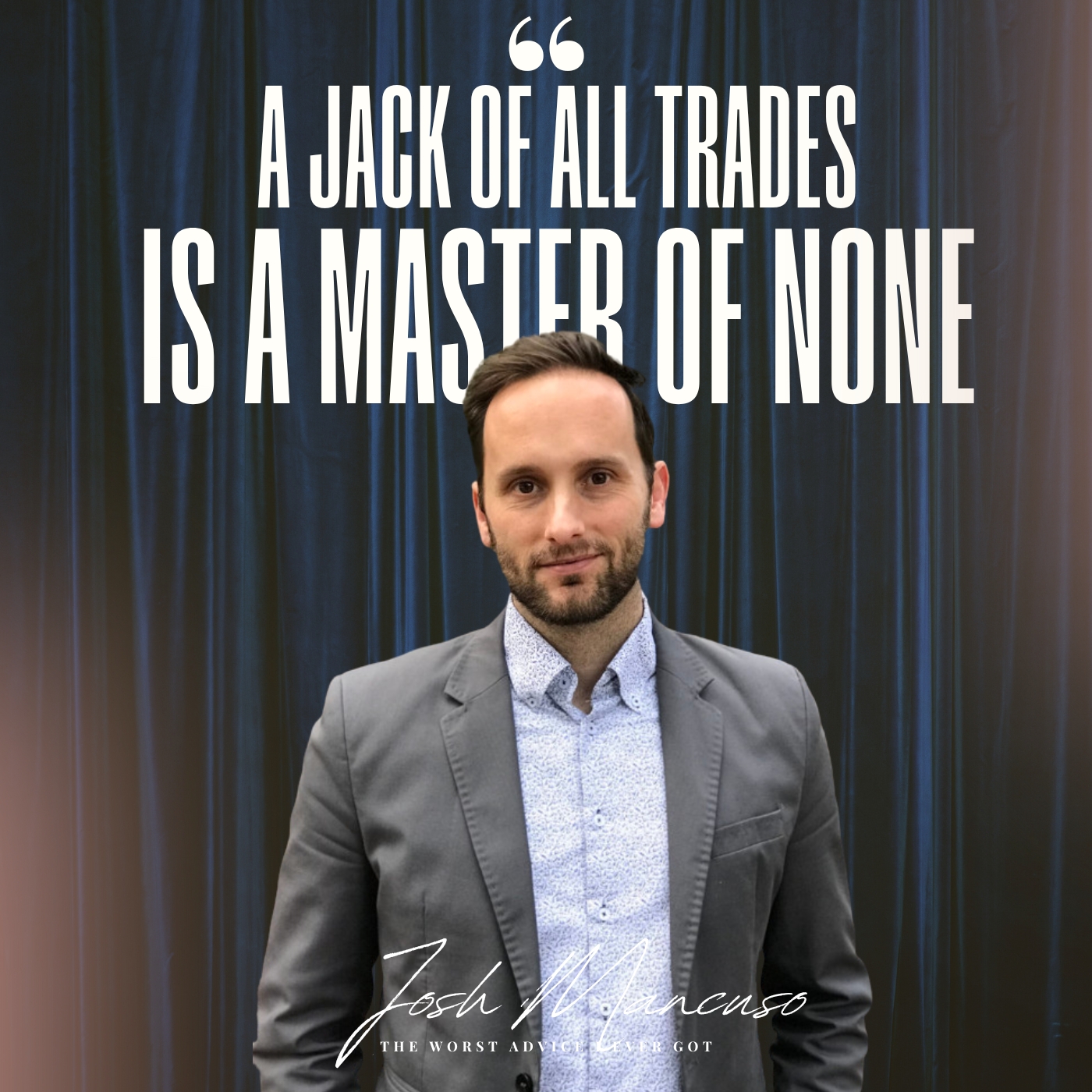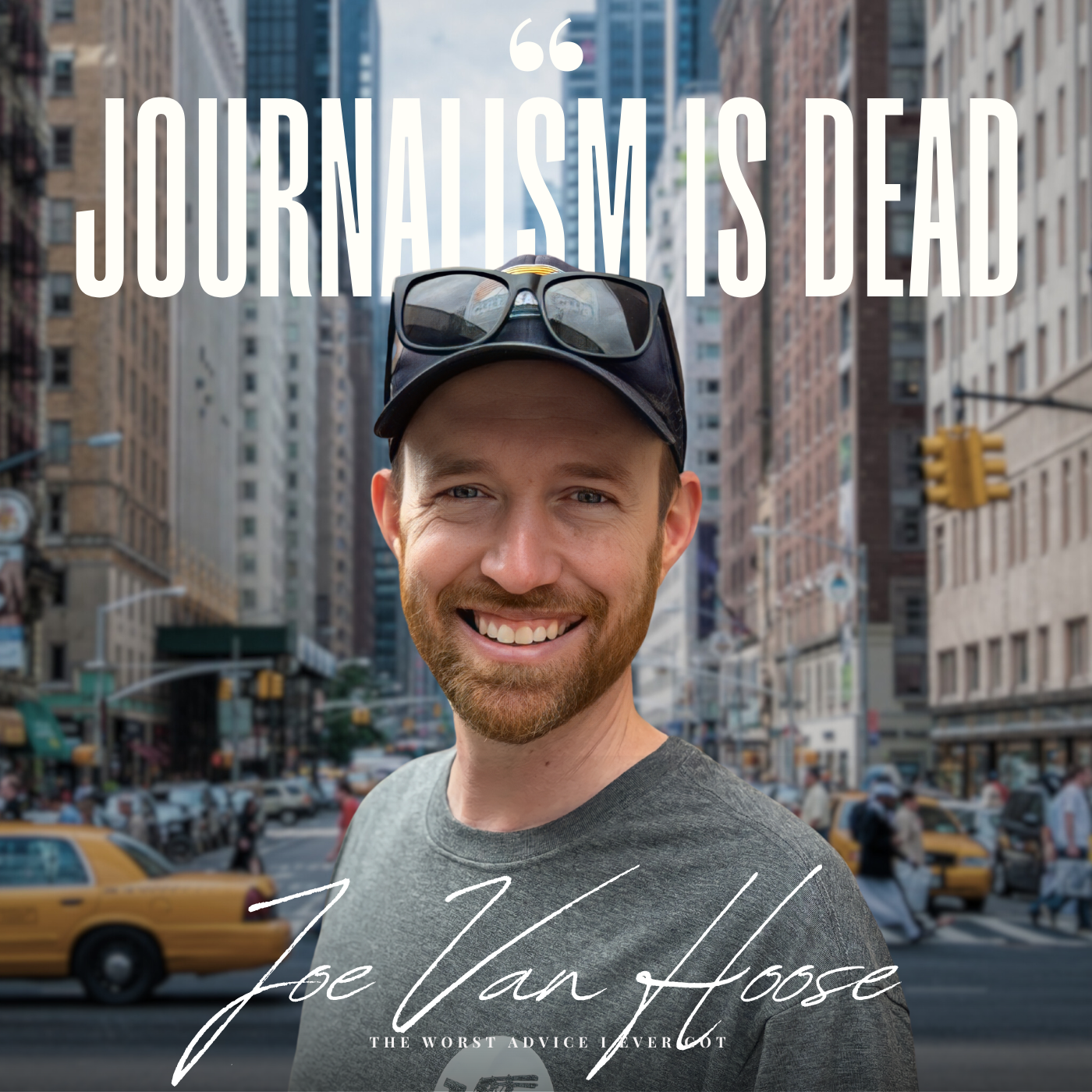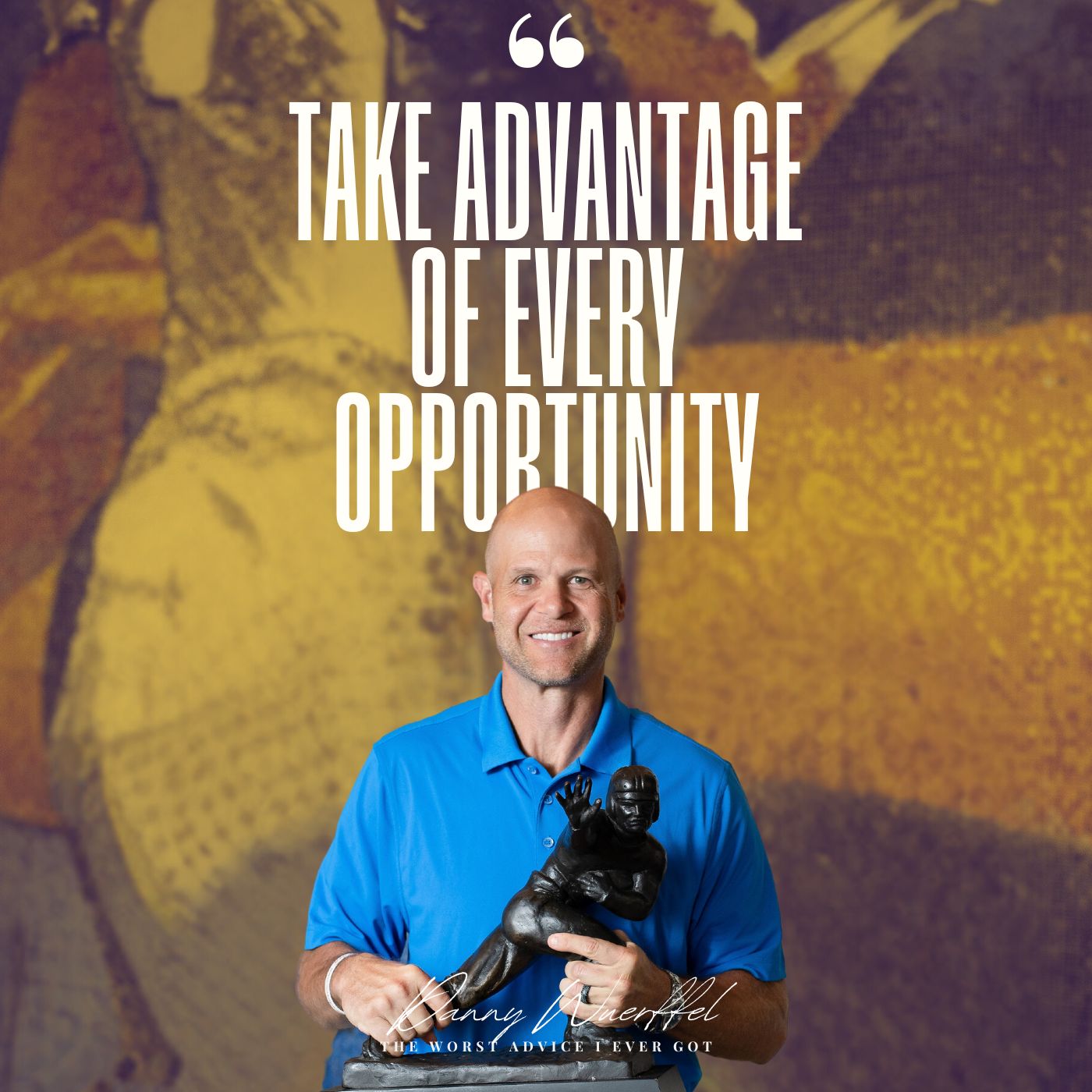Episode Transcript
[00:00:00] Speaker A: Foreign.
[00:00:04] Speaker B: Hey, everybody. Welcome to another episode of the Worst Advice I Ever Got. I'm your host, Sean Taylor, along with my trusty producer, jb.
And today our guest is Zara Adlu.
Zara is a licensed marriage and family therapist based in California.
But she's not your traditional therapist. Her work sits at the intersection of mental health, spirituality, and psychedelic assisted healing.
She's an ibogaine integration coach, a trauma informed practitioner, and someone deeply committed to helping people recover from addiction and reconnect with their truest selves.
The worst advice she ever got, you might wonder.
Psychedelics can't help you and might kill you.
Yeah. We've got a lot to talk about.
Today's conversation goes to places never before seen here on the Worst Advice I Ever Got. So let's dive right, right in.
Hey, Zara, thanks for joining us today.
[00:01:04] Speaker A: Thank you so much for having me.
[00:01:07] Speaker B: So, Zara, we love to jump right in and ask our guest, what's the worst advice you ever got?
[00:01:13] Speaker A: The worst advice that I've ever gotten that is that psychedelics can't help you and in fact, might kill you.
[00:01:20] Speaker B: Wow. Okay. Yeah, we're gonna need some background here, Zara. I think. So jump in, Jump right in. Tell us a little bit about your story here.
[00:01:29] Speaker A: Yeah, so there's a dichotomy to that.
You know, in one way, you are dying because you're leaving behind parts of you that you no longer resonate with anymore when you go on a psychedelic journey. So there's a rebirth that comes out of that. But overall, the chances of a physical death is like less than 1%.
[00:01:51] Speaker C: How did you get in?
[00:01:52] Speaker B: Wow. Yeah. No, I'm like you, jb. I'm like, all right, I gotta know some more. Let's, let's back it up a little bit. Tell us how, how you got here.
[00:02:01] Speaker A: Let me first start off with introducing what ibogaine is. Ibogaine is one of the alkaloids in the aboga plant, which is derived from a root bark, a tree.
And this is a plant that's very sacred in western parts of Africa. So they've been practicing, utilizing this plant medicine in their ceremonies and in their religious practices for centuries before it was introduced in the 60s in the Western world by accident.
And so what it's really, really popular for now is for its anti addictive properties that help people overcome their hard drug use, such as like heroin or alcohol abuse. For years they go into a clinic, they get their ibogaine treatment, and they are rid. Their body is physically capable of going on and surviving life without this basic need, calling on them that they need to take this drug to survive. And I got into this because I was a therapist and I was getting my graduate degree. Well, I am a therapist, but I'm getting my graduate degree. And I've never been exposed to an addict, someone who identifies as an addict or suffers from an addiction, a substance use addiction. And so I figured, you know, I'm going to go right into this and my internship experience. I'm going to actually try out and go into treating people who, who have addiction issues. And so I, I jump right in. I realized, like, there was so much to this world that I didn't understand. And I, it was really intriguing because I met some beautiful souls. And on top of that, it actually helped me get rid of the biases that I had going into treatment settings about these individuals that are highly vulnerable in society.
And so after some time I graduated and I, I watched a documentary titled do introduced the ibogaine alkaloid plant, the, the plant medicine into a treatment with a person who had 17 plus years of heroin addiction. She got her treatment and then was completely rid of her need to use heroin again.
And so that stuck to me and I went on, moved to California, did my. I needed to complete hours to get licensed in the state of California. And so I worked again and then a substance abuse treatment center as a therapist and just realized how, how outdated the treatment model was and the treatment settings that I worked in, like everyone that was coming in had a history of being in a substance use or a rehab treatment center at least three or four times. It was basically like a lifestyle for a lot of these individuals. And so right after I finished my hours, I, I quit my positions because I felt unethical working in a treatment center that, where I couldn't talk about plant medicines.
So I come here because I want to actually talk about ibogaine. But not just that, but the actual therapy that it needs to be in conjunction with in order for someone to have a journey that's fulfilling so that they can start living fulfilling lives.
[00:05:22] Speaker B: Zara, I want to. I want to.
Great background, great information for people like me that literally do not understand some of the context. But, but backing up for just a minute. Who told you that psychedelics can't help you? Where did you get this bad advice from? Was it part of your education system?
[00:05:40] Speaker A: So I was working at a treatment center in Utah during my internship experience in graduate school. And I remember they, One of the directors asked me, well, where do I see myself in three years. And I said, well, I'm going to be as a therapist, but I'm going to get MAPS certified. And at that time, that's the only thing I kind of knew. And MAPS is Multidisciplinary association of Psychedelic Studies, so they work strictly with mdma.
And so that's where I thought I was going to go. I just. I knew that I was going to work with psychedelics with plant medicines. And her answer was, don't talk like that. Don't tell anybody that and that you can actually die.
And I think that's a horrible idea.
[00:06:27] Speaker B: Yeah.
[00:06:28] Speaker A: And I remember, like, in my. You feel it in a. On a visceral level, when someone gives you some information that doesn't sit well with you, you feel that.
[00:06:37] Speaker B: So you just immediately disregarded it as, like, the worst advice you had ever heard.
[00:06:41] Speaker A: Absolutely, because I already had the experience of knowing why it wasn't the worst, you know?
Yeah, at that time, I hadn't. Like, ibogaine that I talk about is the strongest psychedelic in the world as we know it today. So at that time, I wasn't even thinking about doing a journey with ibogaine. So.
So, yeah, maybe if I would have said that to her, she would have, you know, freaked out even more. But in general, I.
Yeah, I had nothing. I. I got into the field of therapy through my first ayahuasca journey. So, like, I. And this is so aligned to who I am. And.
Yeah, it just.
It didn't sit well with me. And I think most people, if they're in tune with their bodies and their intuition, they know when something doesn't feel right. And I highly recommend that people trust that.
[00:07:33] Speaker C: What is the timeline between, like, you're in school and you're trying to be a therapist and then you have to go on a training. What's the timeline from like. Okay, I want to get into this to. You can actually practice plant medicine?
[00:07:48] Speaker A: That's a really good question. In the plant medicine world, they say you have to have a lot of experience. You can't just come in and be a plant medicine woman or a man and be a title as a shaman. You have to do your own work, you have to sit with the medicines for a while, you have to observe. So I'm actually still in that process. I'm. Right now I'm just observing and I'm helping people through their mental journeys afterwards and before to get them prepared for the journey and then to process and make connections through their family systems and history and whatever they came in with. That I know about so that they can take whatever information they've got from their journey and like move on and start a new life journey. So I mean I would say at least like 10 years of experience sitting with these plant medicines, watching, learning and getting mentorship before you can call yourself a medicine woman or a man.
And, and it, and it doesn't even stop there though. Like we're constantly as heal healers working on ourselves always. We're always attuned to our emotions, our thoughts, the way we are perceived, the way we hold space and cater to the emotions of others and help uplift others through their experiences, whether it's spiritual, mental or physical.
And so it's, it's never a.
We just never, you're always growing.
[00:09:12] Speaker B: Why do you think there's so much fear surrounding the use of psychedelics? Or skepticism, for lack of a better word?
[00:09:21] Speaker A: I think the fear comes from the lack of research that's available right now. I think it comes from the unknown, people just not knowing what to expect.
See your environment, what they say about plant medicines, like how it's perceived in your society because there's, there's certain communities where it's just a part of their living and there's certain communities that completely shut it down. So it has a lot to do with different factors in your life.
But I think it all stems from just the unknown, like just not knowing enough about it.
[00:09:54] Speaker B: Discuss more about the research. What is, what is the research or what isn't in the research at this point?
[00:09:59] Speaker A: Well, so a lot of the psychedelic plant medicines were put into Schedule 1 substance groups in the 1960s. So what that means is that there isn't, it's not allowed to be research on human subjects and it's illegal in the US because it's highly addictive. What's interesting is that the plant medicine I've been talking about is actually anti addictive. So they, they placed these psychedelics in this category without even having the proper research the back up. Why?
Because as we know it today, and as facts prove, ibogaine in itself is actually helping people come out of their addiction. So it doesn't even fit the category of a Schedule 1 substance where it's identified as highly addictive.
Just placing plant medicines in the wrong category without proper knowledge.
[00:10:58] Speaker B: Is it being explored more now? Is it being researched more now?
[00:11:01] Speaker A: Absolutely, yeah. So there it is being researched more, I mean in other countries at least. And I believe MD MDMA actually was researched and it passed phase three trials. There they are making an effort to do More testing, even if it's outside the US So like Stanford did a test with ibogaine client, ibogaine clients who suffered from PTSD and traumatic brain injury, who were combat veterans. And so they did their testing and their research in Mexico. So they're finding loopholes for it.
[00:11:37] Speaker C: It's been working for you. Like how, like how do you do it? Like dealing with the, it's, it's, everything that you want to help people with is illegal.
[00:11:46] Speaker A: I know. So I'm actually in the process of getting a legal shield through the Native American Indigenous Church. So that's, that's one avenue I've been working on, but the other is really just, I've been using my voice, doing podcasts, having advocacy for it, and, and also just like partnering with certain clinics that I feel are doing safe protocols, are accomplishing safety through their protocols because this is an under regulated and it's under regulated market. So it's, it's really unsafe when you go to the right wrong places and it's an expensive treatment. So there are a lot of clinics unfortunately out there just doing it for the financial gains.
So it is really important. And that's just how I'm, I'm navigating it right now.
[00:12:39] Speaker B: Where does this fit in the traditional therapy model? Like is this just completely different from the traditional therapy model or is the traditional therapy model right to a point and then you need to insert these treatments as a compliment?
[00:12:54] Speaker A: Yeah, so I, it's definitely the latter. Traditional therapy models are right to a point.
When I do my treatments with clients, I want to know their family background, I want to know what they grew up with. I want to know who in their family received a certain trauma because there's epigenetics that are involved. So I, I really pay attention to the language, to the system that the person came from. And then when it comes to doing like a treatment and wanting to follow up with them, I get really spiritual and existential. So I want to be very non directive. So I want the person to actually lead the discussion. Whereas like in traditional therapy, I may actually be a lot more forthcoming and a lot more direct.
But with, with a ibogaine treatment or any type of psychedelic treatment, this is purely their experience and a lot of the experience is ineffable. So like you have to kind of make sense of it. And then when I know their family history and their background, I, I, that's where I tie it in. So it becomes like an art in a sense.
[00:13:59] Speaker C: Back to the advice on psychedelics, like are you saying that all psychedelics can help you? Are there some bad ones and some good ones? And how do you differentiate?
[00:14:09] Speaker A: I don't think there are bad ones. I think there are some that are stronger than the others, that are more potent than others.
And I specifically have worked with ibogaine and psilocybin. And so with ibogaine there is a larger neuroplasticity window. And what I mean by that is that after your treatment you have one month where ibogaine gets converted into noribogaine in your body, so it stays in your body. And your, your brain is more neuroplastic for up to a month, whereas other psychedelics that lasts up to two weeks.
[00:14:43] Speaker B: So neuroplastic. I'm sorry, can you insert neuroplastic?
[00:14:47] Speaker A: Neuroplastic is your, your minds, your ability to be able to form new connections, to think of new process, like thought processes, to perceive things differently, to create new habits. It's basically like the expansion of the way you think.
And so when you have an ibogaine treatment or any type of psychedelic treatment, you have either two weeks or up to a month where your brain is completely open and receptive to receiving new information and making new connections that can like help you in your life.
Integration is the most important piece here. Like you get the information and then you're like, all right, what do I do with this? How do I process this? And then how do I change my life to adjust to what I just received? And then you practice that.
So it's just a tool. It's not really like the solution.
[00:15:41] Speaker B: I'm curious as to who is advocating for this, generally speaking in public and who is resisting psychedelics.
[00:15:49] Speaker A: So, you know, I think it depends on what area you live in the U.S. i really think that makes a big difference. There are a lot of conservative states and there are a lot liberal and open minded states where I, I live in California, so it's very liberal.
And I've seen psychiatrists be advocates and I seen, you know, psychologists practice this and create protocols for it. So I've, I've been around all types of professionals who actually are for the plant medicines and believe in them where there's resistance. I would say I, I haven't been in those areas to know, but I, I would say that maybe it comes to like people and their religious backgrounds that don't believe in, you know, having anything that's mind altering.
This plant medicine, some of them see it as a drug and some of them really see it as a medicine. So it Just, it's all about perception.
[00:16:41] Speaker C: It's got to be the pharmaceutical industry too, right? I mean, because like, there's certainly plenty of pharmaceuticals that alter your mind that you take, you know, anti anxiety medicine and ptsd. So what's the difference here with like.
[00:16:52] Speaker A: I'm so glad you bring that up because you can actually capitalize on those medications. Like, I'll go into like big pharma will prescribe someone Suboxone, methadone. These are long acting opiates for someone who has a heroin addiction that actually gets them more addicted to that. And it's long term and they have to keep doing it, whereas they won't support bringing an ibogaine clinic into the US that gives people 12 time session and then gets rid of them using all pharmaceutical drugs, all drugs in general.
So it's, it's just, honestly, I see it as a business, Big Pharma being involved in this. So I think to keep people strong onto medications, it is beneficial. I mean, it's, there's capital gains there and it's, you just have to be more aware and see the big. And it just, it brings up like so much anger in me because I'm like, we can really help these people and we choose not to because we don't have that power.
It's cheaper.
It is cheaper in the long run. Yeah, absolutely. That even with like PTSD and mdma, they've said that like a lot of veterans who had ptsd, like after like three sessions, they didn't need to take any medications after that. And yet like, we don't provide these treatments because we would like to keep them on antidepressants, antipsychotics, and you know, it makes the pharmaceutical industry more money, but it's just, it is what it is. So what we can do is spread awareness and hope that people can, you know, find their path through the awareness that they get.
[00:18:34] Speaker B: Sorry, going back a little bit in our discussion, you've, you've referenced religious beliefs, but you've referenced spirituality, and spirituality is a part of this. How does spirituality play a part in the ibogaine journey or just in the healing process altogether?
[00:18:51] Speaker A: All right, so spirituality is when you find meaning in whatever you're receiving in life and applying that meaning to better your life and letting your, your soul's voice like talk and feel connected to a vessel that's not parallel but more so vertical and then taking that and moving forward with it.
[00:19:16] Speaker B: This whole topic is really interesting to me, Zara. I think as we conclude our time today, I Guess. What are you.
What's next for you? What are you hopeful for? You know, is there some other aspect of what you're doing in treatments that you want to, you know, share with our guests? Just. Just kind of take us home. What. What. What's. In the future?
[00:19:34] Speaker A: I'm hopeful for people to not see getting therapy or utilizing plant medicines in conjunction to therapy as a sign of weakness. I'm hoping that they see that as a sign of strength, that they're vulnerable enough to go towards their discomforts, whatever is making them feel dysregulated and helping them, you know, face things. Face things with the help of others so that they can live more fulfilled lives. That is. I want to see people feel empowered in all the parts of themselves, some of them dormant, some of them not, that exist within them, and, you know, just kind of feel into that untapped potential through the use of overall.
[00:20:17] Speaker B: Yeah. Well, this has been incredibly informative, Zara. I can tell you, as someone who knows really next to nothing about the topic, I feel much more informed than I did before. I'm sure our listeners do as well. I can't thank you enough for contributing your time to our. To our podcast to share your experiences and to share your worst advice you ever got.
[00:20:40] Speaker A: Thank you so much. It's been a pleasure.
[00:20:43] Speaker B: Okay. I mean, wow, jb. This is exactly what we met when we said this season isn't like any other.
We're not just talking about bad business tips or awkward career advice anymore. We've gone a little deeper with this episode. Plant medicine and psychedelics, trauma healing.
I mean, I. I didn't really have that on my bingo card when we started this show.
[00:21:07] Speaker C: I actually did have it on my bingo card. I'm incredible at bingo. But you're right. A great example of how, you know, we're expanding the show for our audiences. But just to be clear, we're not handing out any ibogaine samples at the end of this episode.
[00:21:21] Speaker B: Nope. No, no, no, no. No coupons, no ayahuasca punch cards. We're not advocating for anything here, y'. All. I mean, seriously. Except for maybe thinking for yourself. That's the whole point of the show, right? We invite our guests to share the worst advice they ever got, whatever the topic, and we get to learn from the journey they took to challenge it.
[00:21:42] Speaker C: Yeah, exactly. You know, with Zara, you could tell how personal this was. It's not necessarily even about only psychedelics. It was just about her ignoring fear and trusting your gut and doing the work on yourself and then for others.
[00:21:57] Speaker B: Yeah. Yeah. Whether you agree with it or not, you can't ignore the passion behind it and what she's doing and the results that she's seeing from it in people's lives. Right. So that's what makes these conversations so worth having.
[00:22:09] Speaker C: Right. And that's, you know, why we keep making the show.
[00:22:12] Speaker B: That's why we make the show. And we're going to continue to make the show, make it full of conversations worth having. And we've got more stories coming your way that will leave you with plenty of things to think about. So hit that follow button, stay curious, and join us next time on the Worst Advice I Ever Got.



